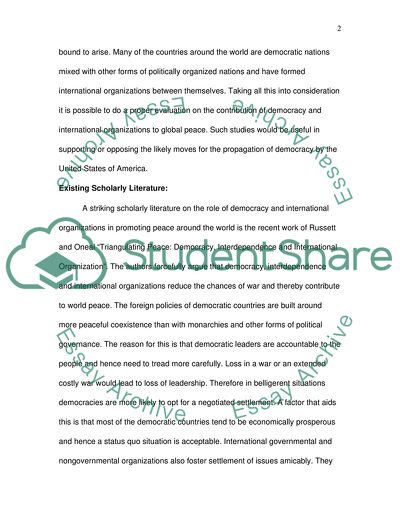
- Home
- Free Samples
- Premium Essays
- Editing Services
- Extra Tools
- Essay Writing Help
- About Us
- Studentshare
- Subjects
- Miscellaneous
- The significance of democracyand international organizations in maintaining global peace
The significance of democracyand international organizations in maintaining global peace - Essay Example

- Subject: Miscellaneous
- Type: Essay
- Level: Undergraduate
- Pages: 4 (1000 words)
- Downloads: 0
- Author: marlinschroeder
Extract of sample "The significance of democracyand international organizations in maintaining global peace"
After the First World War, the League of Nations was formed for the purpose of promoting world peace. It failed and the failure was marked by the Second World War. The United Nations was the successor to the Alliance of Nations with the primary role of ensuring peace among nations and was formed in 1945. (2). Since the demise of Communism with the collapse of the Soviet Union, the United States of America has become the sole super power. It is also been a strong believer and protagonist of democracy.
Thus a push for democracy is bound to arise. Many of the countries around the world are democratic nations mixed with other forms of politically organized nations and have formed international organizations between themselves. Taking all this into consideration it is possible to do a proper evaluation on the contribution of democracy and international organizations to global peace. Such studies would be useful in supporting or opposing the likely moves for the propagation of democracy by the United States of America.
A striking scholarly literature on the role of democracy and international organizations in promoting peace around the world is the recent work of Russett and Oneal “Triangulating Peace: Democracy, Interdependence and International Organization”. The authors forcefully argue that democracy, interdependence and international organizations reduce the chances of war and thereby contribute to world peace. The foreign policies of democratic countries are built around more peaceful coexistence than with monarchies and other forms of political governance.
The reason for this is that democratic leaders are accountable to the people and hence need to tread more carefully. Loss in a war or an extended costly war would lead to loss of leadership. Therefore in belligerent situations democracies are more likely to opt for a negotiated settlement. A factor that aids this is that most of the democratic countries
...Download file to see next pages Read More
- TERMS & CONDITIONS
- PRIVACY POLICY
- COOKIES POLICY